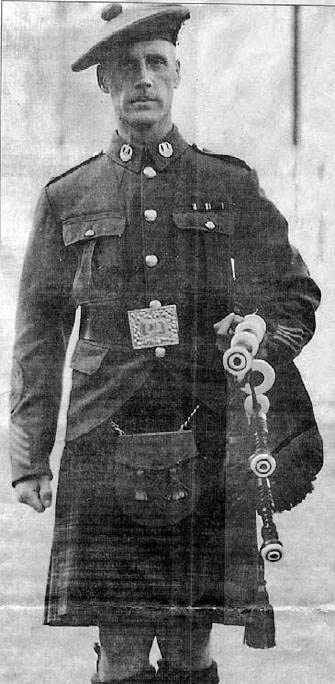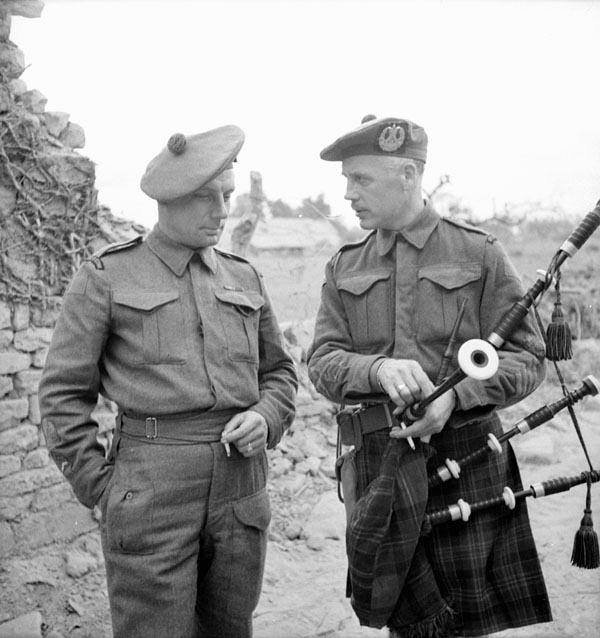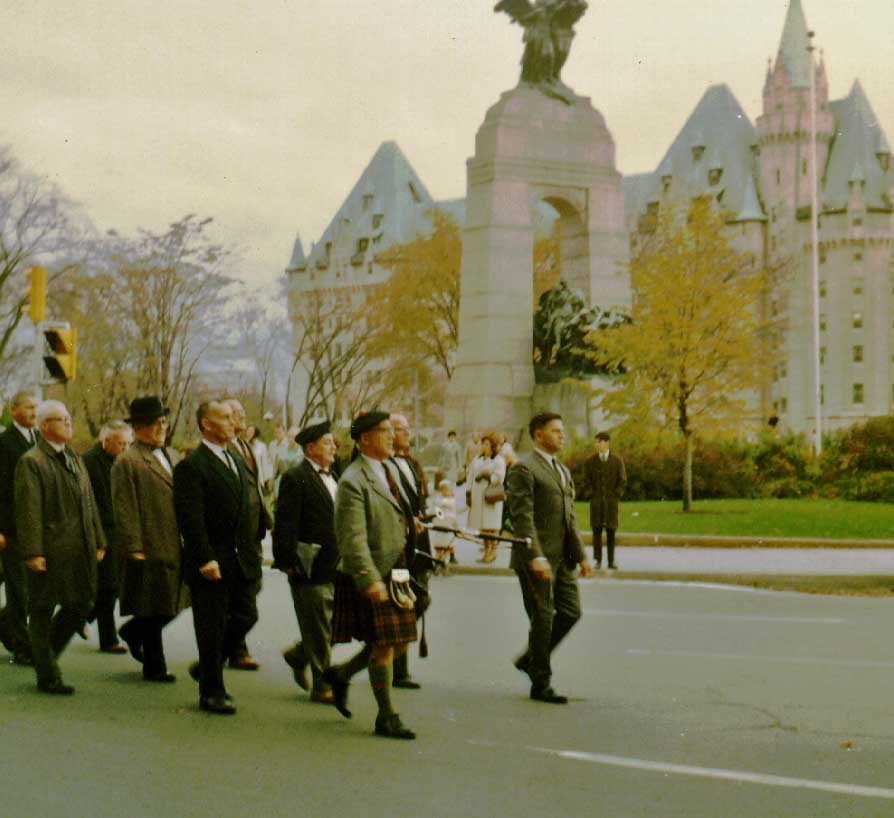Pipe-Major Sam Scott – a personal memory
Originally published in the February 1998 edition of the print magazine. Bill Millin,1st Commando Brigade, is well known as the piper who played onto the Sword Beach on D-Day, June 6, 1944. Lesser-known is that Pipe-Major Sam Scott, Cameron Highlanders of Ottawa, played onto Juno Beach that same day. Scott is memorialized in a fabulous 6/8 march by the great Peter R. MacLeod.
By Sgt. Allan Eaton, CD

“Practice has its own reward – find it!”
Samuel Scott wrote these words on the inside cover of my music dictation book at the end of my first bagpipe lesson in the summer of 1960. I was only six years old at the time and unable to fully comprehend the depth of this insightful notation for my future and frequent reference.
I found that “reward” when I mastered my taorluath exercises, and again when I opened my first savings account with the money I earned from piping at a dinner in Ottawa in 1964. From time to time, I would take my bankbook to my piping lessons to show Mr. Scott. He would cheerfully examine each deposit with the keen eye of an auditor and then impart more wisdom, saying: “If you keep that up, you’ll be able to afford a silver-mounted set of pipes – something you may really want one day.”
Samuel Scott was born in Glasgow on October 6, 1905. His mother and father, Margaret MacLean Paul and William Scott of Glasgow, sailed for Canada two years later and settled in the Ottawa Valley. By the time Samuel was eight years old, he was taking bagpipe lessons and learning Gaelic mouth music from Pipe-Major Tait through the St. Andrew’s Society in Ottawa. In 1920, he enlisted with the Non-Permanent Active Militia, joining the Cameron Highlanders of Ottawa (Machine Gun).
Samuel had a precision-oriented mind in all of his undertakings, becoming fond of quick and simple arithmetic skills at an early age. His appreciation for numbers and the significance of their use led him to his chosen profession as an auditor with the federal government in Ottawa, beginning his career with the Department of the Auditor General, in 1930. In the same year, Samuel married Aileen Waddell of the village of Carsonby, Ontario. Four years later their first daughter, Margaret, was born, followed by a second daughter, Helen, in 1938.

When Germany invaded Poland in September of 1939, Samuel was among the first senior noncommissioned officers of the Camerons to volunteer to fight for Canada as part of the 4th Canadian Infantry Brigade with the Royal Regiment of Canada, the Royal Hamilton Light Infantry and the Essex Scottish. By September 15, 1939, the Camerons’ Pipe-Major was Samuel Scott, who went to war at the remarkable age of thirty-four.
Pipe-Major Scott’s exemplary character, soldiering skills, musicianship, and fatherly manner helped to raise and maintain the morale of the Camerons throughout their training in Iceland and England, and later in battle in northwest Europe. The rigours of combat training and action under enemy fire inspired Pipe-Major Scott to compose several tunes while overseas.
On the evening of November 11, 1943, Pipe-Major Scott attended an Officers’ Mess Dinner at Lyndhurst, at which time he presented to the acting General Officer Commanding a copy of a tune of his own composition, “Major General Keller’s March.” On March 18, 1944, in recognition of long and faithful service to the Camerons, the Officers presented Pipe-Major Scott with a silver-mounted set of pipes. On April 25, 1944, His Majesty the King inspected the 3rd Canadian Infantry Division and the Cameron Highlanders of Ottawa (M.G.) were tasked to supply a Guard of Honour for their Colonel in Chief. His Majesty the King was particularly impressed by the pipe band under the command of Pipe-Major Scott in their ability to render “The King” during the Royal Salute.
Pipe-Major Scott was among the first Camerons to depart for the marshalling area for the invasion of France, accompanied by the Commanding Officer, one other senior noncommissioned officer and a private, as part of the colonel’s command group. They were joined by the regiment and forged in the crucible of the Normandy landing, and then to the strains of “The March of the Cameron Men” and “Pibroch o’ Donald Dhuibh” went straight into the heart of the Nazis at Carpiquet, Boulogne-Calais, Ghent and Nijmegen.
There can be no doubt that Samuel Scott’s presence on the beaches of Normandy on D-Day, with his pipes playing as the Camerons waded through the sea, was the inspiration for the makers of the film, The Longest Day, in which Lord Lovat waves his swagger-stick in the air and shouts the command: “Piper – play the ‘Black Bear’!”

By the winter of 1944, the pipes that Samuel had taken to war had been exposed to shrapnel, the heat and dust on the road to Falaise and the relentless rain and fog along the polders of the Low Countries. The continuing decimation of humanity and the growing Honour Roll of the Camerons failed to discourage Pipe-Major Scott. In spite of these odds, the band paraded on December 16, 1944, in Nijmegen, playing a retreat with the Queen’s Own Cameron Highlanders and the Queen’s Own Cameron Highlanders of Canada, for the pleasure of the 3rd Division Headquarters personnel. It was one of the finest performances that Pipe-Major Scott had ever rendered and lent itself to the enthusiastic praise of the GOC later in the Officers’ Mess. On New Year’s Day 1945, Pipe-Major Scott presented to the GOC a 6/8 march that he also composed, “Major General Spry’s Welcome to 3rd Division.”
With victory in Europe, Samuel returned to his young family and his prewar profession as an auditor. He immediately commenced a teaching program to attract young pipers to the Camerons, and in the early 1960s, Samuel offered private tuition at his home in Manotick, Ontario.
Samuel Scott also instilled valuable character-building qualities such as integrity, initiative, and honour and respect for elders. He encouraged and demanded that we master and continually practice fundamental bagpipe music skills; clean and distinct fingering, proper expression and steady blowing. Many of his students went on to become prize-winning pipers and pipe-majors with the Cameron Highlanders of Ottawa (MG) and other pipe bands in Canada and abroad.
Sadly, Samuel Scott gave up this life in a motor vehicle crash on January 3, 1972. He was on his way to pick up a shipment of new practice chanters that Kenny Murchison had sent to him from the United States. True to his kindness of heart, Samuel went first to the aid of the driver who struck his car, to inquire of her well-being. She was injured only slightly, but unfortunately, Samuel died before adequate medical assistance could be provided.
Samuel Scott is buried beside his wife Aileen, in Capitol Memorial Gardens in Ottawa, but Samuel’s inspiration for all of us lives on within the great music. You will find him on page 26, Edcath Book II, in the melodic 6/8 march bearing his name, composed by his close friend Peter MacLeod. The pipes that Sam Scott played at Normandy are periodically on display at the Imperial War Museum in Ottawa when they are not on display at the Museum of Man.
I have not yet purchased my own silver-mounted set of bagpipes, but I do enjoy the loan of such from the Canadian Argylls through which the music and knowledge of Samuel Scott have for me, alleviating the need to seek the purchase of what money can never buy: the ability to learn.
Sgt. Allan Eaton, CD was an Instructor with the Argyll & Sutherland Highlanders of Canada (Princess Louise’s) and the former pipe-major and founding member of the Scandinavia Seaways Pipes & Drums of Hamburg, Federal Republic of Germany, winners of the German Pipe Band Championship in 1989.
Related
 Bill Millin, 1923-2010
Bill Millin, 1923-2010
August 31, 2010
 D-Day piper Millin to receive statue
D-Day piper Millin to receive statue
November 30, 2009
 The pipes on D-Day
The pipes on D-Day
June 5, 2019

Good piece. I’ve long heard his name but knew little about him.
JM
Indeed a heartfelt article. I was wondering if any readers could enlighten us on the names of some of Sam Scott’s other students?